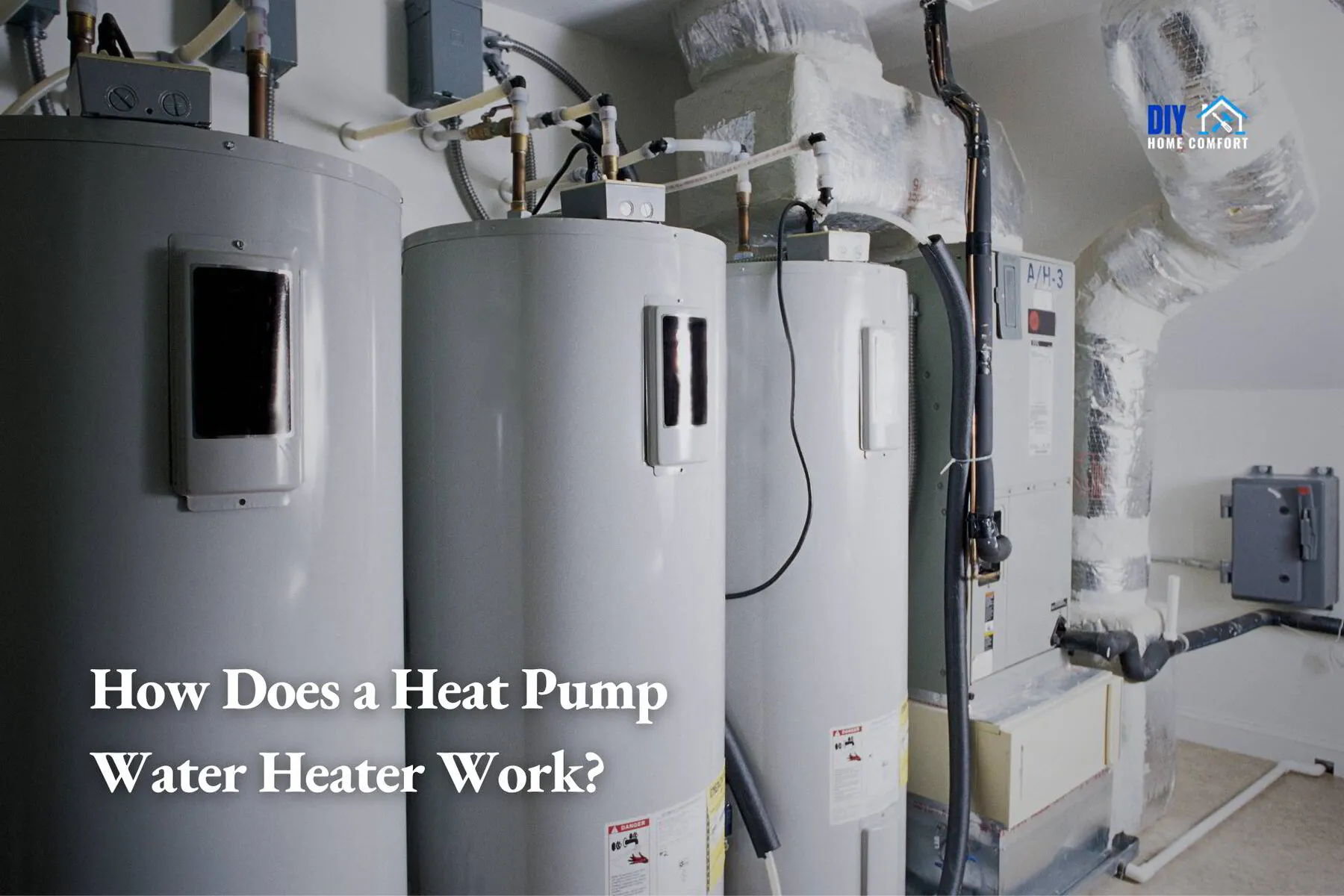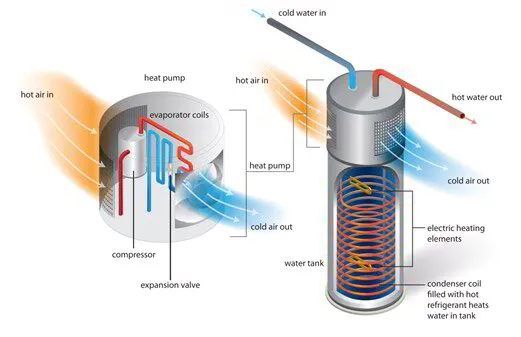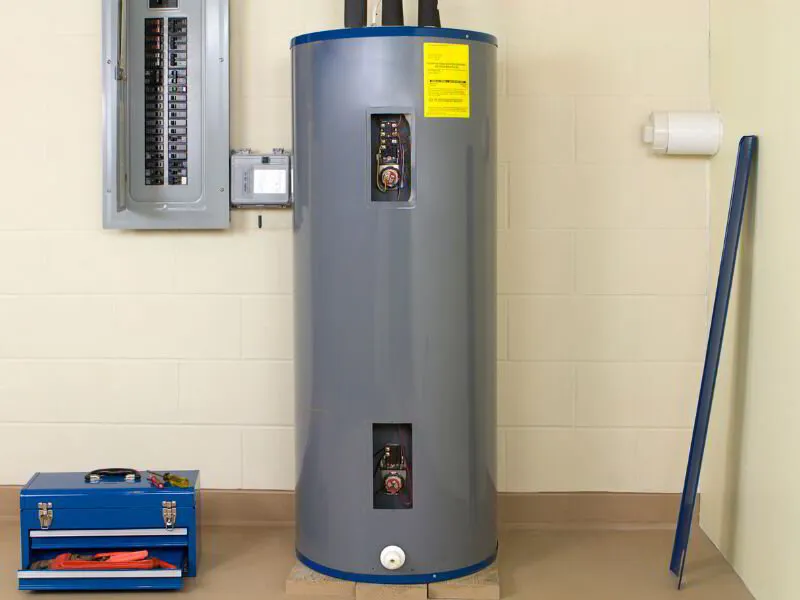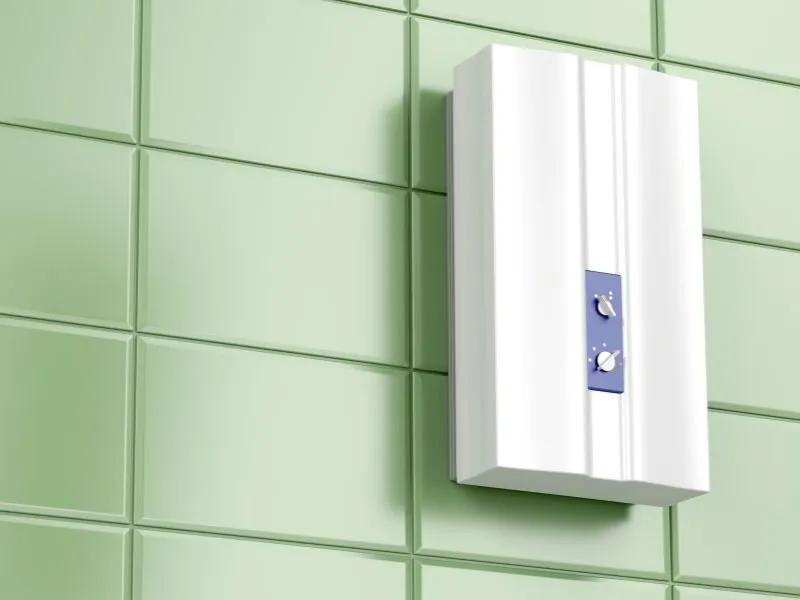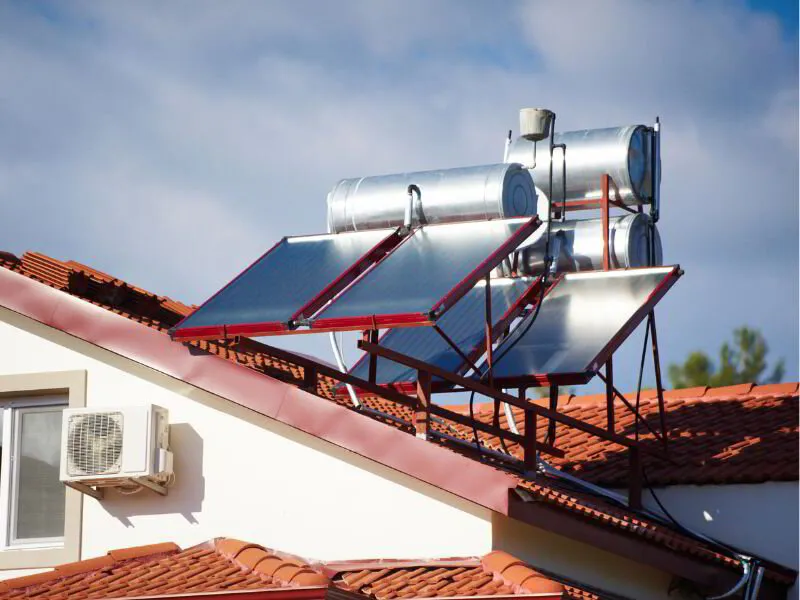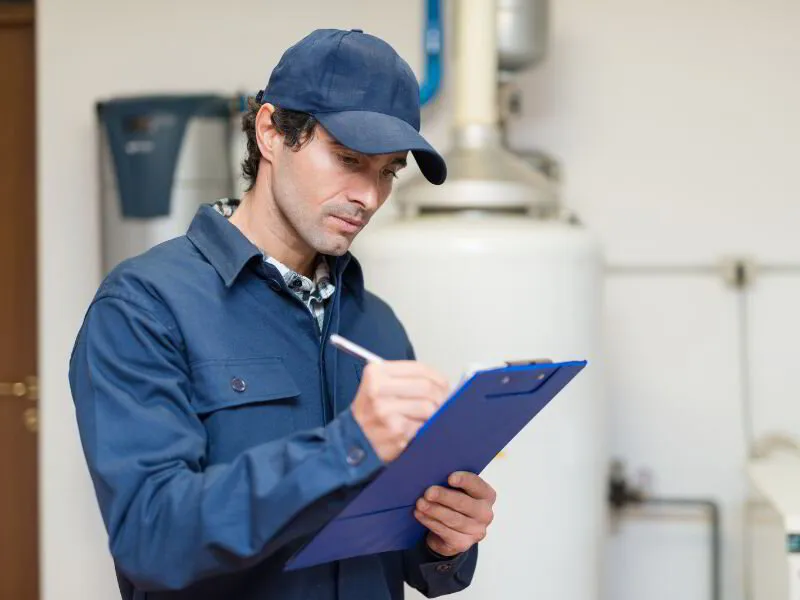Are you a homeowner looking to save money on your energy bills? Or maybe you're seeking more eco-friendly home comfort and convenience options.
No matter what brings you here, one thing is sure: learning how a heat pump water heater works can help lower your utility bills and reduce your environmental impact.
Heat pump water heaters are quickly becoming the go-to option among homeowners thanks to their high-efficiency rate, low maintenance requirements, and cost savings over other hot water systems.
In this blog post, we'll explore precisely how heat pump water heaters work and why they're such an attractive choice for so many people.
By the time you're done reading, you'll have all the information needed to decide whether a heat pump system is suitable for your home!
📘 Key Takeaways
- Energy Efficiency: Heat pump water heaters are incredibly efficient, producing up to three times more heat energy than the electrical energy they consume, leading to significant energy savings.
- Working Mechanism: These heaters work by extracting heat from the surrounding air and transferring it to the water, making them a highly efficient method for heating water.
- Financial Incentives: Homeowners in the US and Canada may be eligible for tax incentives and rebates when switching to a heat pump water heater, further enhancing cost savings.
- Eco-Friendly Choice: Opting for heat pump water heaters helps reduce carbon emissions and generate less waste, making them an environmentally friendly option.
- Selection Factors: Considerations like local climate conditions, initial cost, size, and long-term energy efficiency should guide your choice of a heat pump water heater.
How Does a Heat Pump Water Heater Work?
A heat pump water heater works by extracting heat from the surrounding air and transferring it to the water.
It uses a fan to draw in the warm air, which then passes over a heat exchanger containing a refrigerant.
The refrigerant absorbs the heat from the ambient air, and turns it into a gas, which is then compressed to raise the temperature.
Next, the hot gas is passed through another heat exchanger containing the water to be heated.
The heat is transferred from the gas to the water, then circulated to the storage tank.
The process repeats until the water reaches the desired temperature, resulting in a highly efficient method of heating water.
Image Courtesy of Energy Star
Types of Hot Water Heaters
Although the primary focus of this article is on heat pump water heaters, it's helpful to have knowledge about the various types of water heaters that you can choose from
Conventional Storage Water Heaters
Conventional storage water heaters are the most common water heaters used in households, providing hot water through a large storage tank heated by electric, natural gas, or propane heat sources.
Although they have a lower upfront cost and are dependable and easy to install, they tend to be less efficient than other heating systems because they tend to lose excess heat when not in use, particularly when not insulated.
However, for homes with lower hot water demand consisting of five people or fewer, they remain a viable and low-cost solution for heating water.
The size of a traditional electric water heater storage tank varies from 20 to 120 gallons, depending on the house's size and the model of the water heater.
Tankless Water Heaters
Tankless water heaters are an innovative option that provides hot water on demand through direct water heating as it passes through a heat exchanger coil.
Tankless electric water heaters provide higher energy efficiency and take up less space than conventional storage water heaters.
However, tankless water heaters have a limited heating capacity, making them unsuitable for households with high demand for hot water.
They also have a higher upfront cost than traditional water heaters, but energy savings can offset these costs over time.
Proper sizing and selection are essential elements to consider when installing a tankless water heater.
Overall, tankless or demand-type water heaters are a great alternative to conventional water heaters that offer energy efficiency, endless hot water supply, and space-saving benefits.
Solar Heaters
Solar water heaters use heat energy from the sun to heat water for household use.
They consist of solar thermal collectors installed on the roof or another open area, which absorbs heat from the sun's rays.
The heated water is then stored in a tank, which can be electrically backed up to ensure hot water is always available.
Solar water heaters are an environmentally-friendly option since they depend on renewable energy from the sun.
They are also cost-effective over the long term since the energy source is free.
However, they tend to have higher upfront costs than traditional water heaters, so they may not be suitable for all households.
Additionally, solar water heaters' efficiency depends on the amount of sunlight received, which can vary depending on the climate and seasonal changes.
Heat Pump Water Heaters
Well, this whole article is dedicated to informing you about heat pump water heaters, so keep reading to learn more...
Energy Efficiency
One of the most significant advantages of heat pump water heaters is their high energy efficiency.
They can produce up to three times as much energy as they consume, making them one of the most energy-efficient options for heating water.
This is because they derive heat from the surrounding air rather than generating heat directly from it through electrical resistance or combustion, as other water heaters do.
By consuming less energy to heat water, heat pump water heaters can lead to significant energy savings and lower utility bills.
Overall, energy efficiency is one of the essential benefits of heat pump water heaters.
It is a significant factor in making them an attractive alternative for homeowners looking to reduce their energy consumption and environmental footprint.
Tax Incentives and Rebates
As a homeowner in the US or Canada, you may be eligible for tax incentives and rebates when you switch to a heat pump water heater, which is an advantage you should consider.
For example, in the US, tax credits of up to 30% of the total project cost of installing a heat pump water heater can be claimed.
Similarly, Canadian homeowners can apply for a grant of up to $1000 to replace a domestic water heater with an ENERGY STAR certified domestic heat pump water heater (HPWH).
The federal government and state and local authorities often offer incentives for improvements that increase home energy efficiency to reduce carbon emissions and help customers save on energy costs.
For example, heat pump water heaters are considered energy-efficient, so they receive rewards due to their low environmental impact and energy-saving potential.
It's essential to check with your local authority for detailed information on the tax credits and rebate programs before making the switch.
In addition, homeowners need to ensure that they meet the qualifications and follow the application process accurately.
By considering the tax incentives and rebates available, homeowners in the US and Canada can save even more money while switching to an even more energy-efficient and eco-friendly heating alternative like a heat pump water heater.
Environmentally Friendly
Heat pump water heaters are an excellent choice for homeowners who want to reduce their environmental footprint.
Using the energy from the surrounding air rather than generating heat on their own, heat pump water heaters can significantly reduce carbon emissions compared to conventional water heaters relying on combustion or electrical resistance for heating.
Heat pumps are also more efficient at converting energy, allowing them to transfer three times as much energy as they consume.
Therefore, by consuming less energy for heating and relying on renewable energy sources, heat pump water heaters have a more minor impact on the environment.
Additionally, old or inefficient appliances need to be replaced eventually, making it necessary to dispose of them responsibly.
Heat pump electric water heater heaters have an extended life span and use fewer resources during their operation.
This means they generate less waste when they are eventually disposed of and require fewer raw materials for production, which makes them even more eco-friendly.
It May Not Work in Colder Climates
Although heat pump water heaters are an energy-efficient and eco-friendly solution, they may not suit all climates.
For example, in colder climates, with temperatures below 40ºF (4.4ºC), the air may not contain enough energy to effectively capture and transfer it to the household's water heater.
Similarly, in extremely cold climates, some models also need a supplementary electric power source to increase their efficiency.
It is essential to look into your specific climate conditions before acquiring a heat pump water heater, as it might not be suitable for certain weather conditions.
Ensure you get informed advice from a trusted expert before purchasing.
Higher Upfront Cost
Heat pump water heaters often have a higher initial cost than traditional or electric heating solutions.
This is mainly due to their energy-efficient characteristics and the materials used in the manufacturing process.
Although it might seem that paying a high upfront cost is counterintuitive, most homeowners will recuperate the extra money invested initially in energy savings in the long term.
However, it is worth noting that choosing an efficient heat pump system can be expensive, and not everyone has the budget for such a purchase.
Additionally, potential buyers should also consider factors like installation costs and factors like climate conditions when making their decision.
Factors to Consider Before Installing a Heat Pump Water Heater
When selecting a heat pump water heater for your home, evaluating all the factors that may influence your decision is important.
Consider the climate conditions, the upfront cost of purchasing and installing a system, and its long-term energy efficiency and life expectancy.
You can choose the best option for your needs by assessing all these variables.
Size
Size is an essential factor when selecting a heat pump water heater for your home.
The unit's storage tank size should reflect not only the number of people in the household but also their hot water needs.
For example, households that require more than 90 gallons of hot water daily may require a larger storage tank than those with lower demand.
Therefore, it is important to correctly measure the space available for installation and select a unit to suit those dimensions.
Furthermore, it is recommended to consult a professional installer or plumber before making a purchase, as they can provide sound advice on selecting the right size for your home.
Cost
The cost is a significant factor to consider if you're in the market for a new water heater.
A standard 50-gallon hot water heater can cost anywhere from $500 to $1,000 (not including installation), while a heat pump water heater generally costs more upfront.
Forbes reports that you can expect to pay between $1,500 and $3,000 for a heat pump water heater instead of $500 to $1,000 for a traditional tank water heater.
However, it's important to note that heat pump water heaters have lower operating costs and can save the average residential customer up to $800 on their energy bills, making it a worthwhile investment in the long run.
Additionally, installation costs for heat pump water heaters are similar to the unit price, which may be a factor to consider if you weigh the pros and cons.
Ultimately, the higher upfront cost may be worth it for homeowners looking to save on energy bills and reduce their overall carbon footprint.
Frequently Asked Questions
What's a Hybrid Water Heater?
Hybrid water heaters combine traditional tank heaters and heat pump technology.
This type of water heater utilizes two different heating systems to provide hot water, giving you the advantages of both systems.
The initial cost can be higher than a traditional tank water heater. However, it operates more efficiently and saves on energy bills in the long run.
Are Heat Pump Water Heaters Worth It?
Heat pump water heaters are a great option for households looking to reduce energy costs and increase efficiency.
They provide hot water more efficiently than traditional tank systems, often resulting in lower monthly bills over time.
Heat pump water heaters also last longer than their counterparts, so the upfront cost can be worth it if you plan on living in your home for many years.
When Should You Replace Your Water Heater?
You should consider replacing your water heater if it is over 10 years old, is beginning to rust or corrode, or shows signs of other damage.
Other symptoms that replacement may be necessary include higher energy bills and insufficient hot water in the home.
If you can't remember how old your water heater is, you can check its serial number to find out its age.
How Long Will a Heat Pump Water Heater Last?
Heat pump water heaters can last up to 15 years with proper maintenance and care.
With regular servicing and inspections, a heat pump water heater can provide reliable hot water for many years.
However, its efficiency and reliability may be reduced if the system isn't properly maintained or unserviced for too long.
It is, therefore, essential to have your heat pump water heater serviced regularly and inspected for any signs of damage or wear.
Finally!
In conclusion, heat pump water heaters have many benefits to consider.
Homeowners are encouraged to weigh the potential pros and cons and do their research to decide whether investing in this energy-efficient appliance is right for them.
Cost savings, environmental stewardship, and extended life span are vital factors that should be considered before making such a large purchase.
If you're interested in learning more about how to lower your monthly energy bills, increase efficiency, and reduce emissions while keeping your home's hot water system running optimally, then be sure to continue reading our other homeowner plumbing-related articles here on our blog.
Scott Harding
Scott is the main author of DIY Home Comfort. He's also an experienced HVAC technician that enjoys home renovation and spending time with his family. You can find out more about him here.
